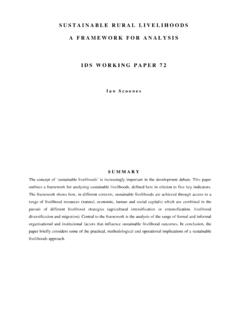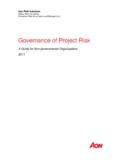Transcription of Declining to Learn From the East? The World Bank on ...
1 Declining to Learn From the East? The World bank on governance and development Mick Moore IDS Bulletin , 1993 Institute of development Studies 1993 * This article was first published in the IDS Bulletin Volume 24 No 1 good Government? edited by Mick Moore. Institute of development Studies 1993. Declining to Learn From the East? The World bank on governance and development 1 Mick Moore Summary The World bank s policy statement on good government governance and development (1992) represents the most thoughtful official contribution to the debate from the aid donors.
2 It does not discuss good government in terms of type of political regime ( multi-party competitive democracy with civil rights), as do many aid donors but deals instead with issues of government procedure and process and their implications for economic performance. Attention is focused on four key dimensions of good government; public sector management; accountability; the legal framework for development ; and information and transparency. The document contains a great deal which is valuable. However, it is in some major respects both misleading and unhelpful in the face of real political problems.
3 The overall approach is very much shaped by Western political social and legal doctrine, and appears not to have been influenced by the actual experiences of the most economically-successful countries, especially those of East Asia. Article 1 Introduction The World bank s recent policy statement on good government governance and development (1992), (henceforth termed governance ) may, like many of the bank s major policy statements, be interpreted in two different ways. One may take it at face value, as a statement of: what the bank thinks are the important governance issues with which it is able to deal given the limitation imposed by its non-political mandate; what the bank has been doing in the governance field; and what it proposes to do in future.
4 Alternatively, one may read governance as a set of signals intended to influence the thinking of the rest of the World , notably the governments of the bank s client countries, about what constitutes good government, and therefore what they should themselves be doing independently of the bank . governance appears to have been written with this latter role in mind. While it contains a great deal of explicit and implicit qualification about the difficulties of making useful generalisations about such a vast, often-nebulous and generally contested subject, the document is organised around the proposition that there is a small and memorable number (four) of key dimensions of governance : (i) public sector management; (ii) accountability; (iii) the legal framework for development ; and (iv) information and transparency.
5 The outside World may forget, or never read, what governance has to say in detail about, for example accountability , but, because accountability is one of the major themes, the idea will now receive more In this article I am concerned with governance s signalling role: with the question of whether it constitutes a good guide to good government generally. This is an important question, because governance will be taken seriously. The excellence of the World bank s organisation and the sophistication of its dissemination and outreach activities mean that its views are generally widely propagated and respected.
6 governance , however, has a special claim to attention in the context of the good government debate. For the policy statements now emanating from other aid donors, especially governments of major bilateral donors, tend to be relatively militant and provocative in asserting that (multi-party) democracy and civil liberties are essential components of good government , and conditions for aid. By contrast, governance is both relatively modest and measured in tone and, what is more important, avoids these form-of-government dimensions of the good government agenda that are most likely to kindle dispute and resentment.
7 The concept of governance is defined rather loosely as the manner in which power is exercised in the management of a country s economic and social resources for development (p1). governance makes a useful distinction between three different aspects of the concept of governance and essentially confines itself to the procedural dimensions: (i) the form of political regime (parliamentary/presidential, military/civilian, authoritarian/democratic); (ii) the processes by which authority is exercised in the management of a country s economic and social resources.
8 And (iii) the capacity of governments to design, formulate, and implement policies, and, in general, to discharge government functions. The first aspect clearly falls outside the bank s mandate (p58). Further, and consistent with its primary banking role, the bank sees its governance mandate to lie essentially in areas that impinge directly on economic policy and management. It avoids the more contentious aspects of the good government agenda and establishes a plausible claim to be dealing with the more practical aspects of greatest long run significance.
9 Given also that governance is the product of a task force of 22 bank staff, was something like two years in gestation, and has been accompanied by a serious research effort,3 it can claim considerable weight in comparison with the sparse but assertive statements on governance emanating from other aid donors. It is the most thoughtful extant official contribution to the good government debate. It is not of immediate concern here whether the World bank will be successful in persuading its critics and clients that governance and the active promotion of good governance do not trespass on political issues that are outside the bank s mandate.
10 Evidently the line the bank tries to draw between what is and is not political is fragile and perhaps It is a line that the bank is obliged to draw because its own constitution prohibits engagement in politics . I refer at the end of the article to some of the consequences of this non-political approach to political issues. 2 Agenda The issues covered in governance are vast much of the combined subject matter of political science, government and political philosophy. It would be easy, at least for the erudite, to amass illustrations of how the authors who anyway had only 60 pages at their disposal simplified complex issues, ignored important topics, and generally made the World appear more clear-cut than it is in reality.











